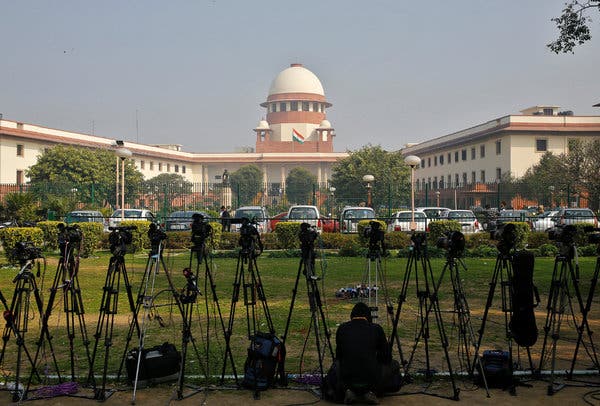Death toll reaches 40 in Russian strike on Ukraine
The death toll from a Russian missile strike in the Ukrainian city of Dnipro rose to 40 on Monday with dozens more missing, making it the deadliest civilian incident of Moscow’s three-month campaign of hurling missiles at cities far from the front.
Kyiv says the mass civilian deaths, which it describes as terrorism, demonstrate why it needs more weapons to defeat Russian forces 11 months after they invaded. Russia denies intentionally targeting civilians.
Germany’s Defence Minister Christine Lambrecht resigned on Monday, while her government came under mounting pressure to let allies send Ukraine heavy tanks, at the start of what is expected to be a pivotal week for Western plans to arm Kyiv.
Ukrainian officials acknowledged little hope of finding anyone else alive in the rubble of Saturday’s attack in Dnipro, but President Volodymyr Zelensky said the rescue in the central Ukrainian city would go on “as long as there is even the slightest chance to save lives”.
“Dozens of people were rescued from the rubble, including six children. We are fighting for every person!” Zelensky said in an overnight televised address.
Moscow, which has been conducting large-scale strikes on Ukrainian cities mainly targetting power generation infrastructure since October, said it was not to blame for the destruction in Dnipro, which it said was caused by Ukrainian air defences. Kyiv says the apartment building was hit by a Russian ship-to-ship missile, of a type that Ukraine does not have the capability to shoot down.
At least 40 people were killed in the attack with 30 still unaccounted for, city official Gennadiy Korban said. He said 75 people were wounded including 14 children.
Tank week
Tens of thousands of people have been killed since Russia invaded Ukraine on February 24, and about a quarter of the population has fled their homes.
Ukrainian forces recaptured swathes of territory during the second half of 2022. But the front lines have largely been frozen in place for the past two months, despite intense fighting in which both sides have taken heavy losses.
Kyiv says a key to breaking the stalemate would be Western tanks and armoured vehicles, giving its forces the capability to break through Russian lines.
Western countries have so far stopped short of sending heavy tanks, a taboo finally broken at the weekend by Britain pledging a first squadron of Challengers. But the far more widely used German-made Leopards are widely seen as the most likely workhorses of a future Ukrainian armoured force, though that would require permits which Berlin has yet to grant.
With US Defence Secretary Lloyd Austin due to host allies at an air base in Germany on Friday discussing aid for Ukraine, the German government said Chancellor Olaf Scholz had accepted the resignation of Lambrecht, his defence minister.
Lambrecht had been criticised in recent days for tone deafness after an upbeat New Year’s Eve message filmed in front of fireworks, in which she spoke of the opportunities she had to meet “interesting, great people” as a result of the Ukraine war.
Germany’s allies have been increasingly direct in their demands that Berlin provides Leopards, or at least allow them to do so.
“I call for decisive actions by the German government,” Polish Prime Minister Mateusz Morawiecki said on Monday during a visit to Berlin, to applause from a group of lawmakers gathered in the city’s Jewish Museum for a gala.
“The battle for freedom and our future is raging as we speak,” he said. “Tanks must not be left in storehouses, but placed in their hands.”
Finland’s Defence Minister Mikko Savola told Reuters: “It depends very much on Germany’s lead how we act with these Leopard tanks. These require a German export permit and in addition to that, the German defence industry has a very strong role in this, in how substitutive equipment can be obtained.”
Moscow has accused the West of escalating the conflict, although Russia also says the supply of tanks will not affect the course of the war. The British Challenger tanks “will burn like the rest”, Kremlin spokesman Dmitry Peskov said on Monday.
Moscow claimed last week to have captured the eastern salt-mining town of Soledar, in what would be its biggest battlefield success since last August. Kyiv says it still has some presence in the town and fighting continues.
“Put simply, the battle continues,” Deputy Defence Minister Hanna Maliar said on the Telegram messaging app. “Everything else is unverified information.”
Ukraine’s Western allies say the fight for Soledar, with a pre-war population of barely 10,000, is unlikely to have a much wider impact, except insofar as the huge losses there could sap manpower both sides need for decisive battles that lie ahead.
Ukraine has been warning that Moscow could be planning a new assault in the coming weeks, including from close ally Belarus, which has allowed Russia to use its territory as a staging ground but has so far resisted joining the war directly.
Russia and Belarus began joint military aviation exercises on Monday. Minsk said the drills are defensive and it will not enter the war.
“We’re maintaining restraint and patience, keeping our gunpowder dry,” said Pavel Muraveyko, first deputy state secretary of Belarusian Security Council, according to a post on the Belarusian defence ministry’s Telegram app on Sunday.
Russia calls the war a “special military operation” needed because of Kyiv’s increasingly close ties with the West, which Moscow says were a security threat. Ukraine and its Western allies call it an unprovoked invasion to seize land.






